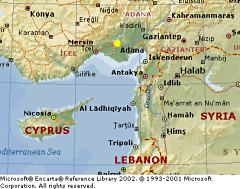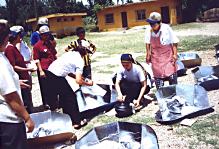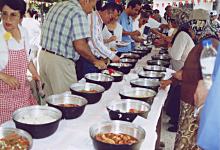
Turkey Project off to Good Start
If all goes according to the plan laid out by Mr. Abdullah S. Paksoy, thousands of Turkish families will have the equipment and knowledge to solar cook within a period of just a few years.
 Mr. Paksoy has spent years preparing for his term as president of Seyhan Rotary Club of Adana, Turkey, and the solar cooking project he would orchestrate. Mr. Paksoy first contacted Solar Cookers International (SCI) in 1999 regarding his plans to spread solar cooking in Turkey. Over the next 15 months, he consulted often with SCI on topics such as specifications for plastic insulating bags, sources for pre-foiled cardboard for mass producing CooKits, ideas for creating public awareness, and project scope. During this time he received many of SCI’s instructional booklets, some of which were later translated into Turkish. Through networking, SCI helped the Adana Rotarians find multiple North American Rotary clubs willing to offer support. California Rotarian Wilfred Pimentel and his wife, Marie, who helped launch Rotary solar cooker projects in five other countries, contributed their experienced wisdom. SCI directed Mr. Paksoy to Solar Household Energy, Inc. (SHE), which sent Dr. Barbara Knudson (an SCI volunteer and board member) to train solar cooking teachers in Turkey.
Mr. Paksoy has spent years preparing for his term as president of Seyhan Rotary Club of Adana, Turkey, and the solar cooking project he would orchestrate. Mr. Paksoy first contacted Solar Cookers International (SCI) in 1999 regarding his plans to spread solar cooking in Turkey. Over the next 15 months, he consulted often with SCI on topics such as specifications for plastic insulating bags, sources for pre-foiled cardboard for mass producing CooKits, ideas for creating public awareness, and project scope. During this time he received many of SCI’s instructional booklets, some of which were later translated into Turkish. Through networking, SCI helped the Adana Rotarians find multiple North American Rotary clubs willing to offer support. California Rotarian Wilfred Pimentel and his wife, Marie, who helped launch Rotary solar cooker projects in five other countries, contributed their experienced wisdom. SCI directed Mr. Paksoy to Solar Household Energy, Inc. (SHE), which sent Dr. Barbara Knudson (an SCI volunteer and board member) to train solar cooking teachers in Turkey.
According to Dr. Knudson, “Turkey has substantial industrial potential, a solid agricultural base which feeds the nation and exports delicacies, a growing middle class — in short, most of what is needed to make the leap to [a] fully-developed country.” However, the economy is shaky, with high inflation and unemployment nearing 20 percent. This — coupled with the fact that the price of butane, a common cooking fuel in Turkey, has had a six-fold increase in three years — was a primary factor in the desire to spread solar cooking in Turkey.
 Mr. Paksoy has done extensive planning in hopes of conducting a successful, sustainable project. Says Dr. Knudson, “He did everything correctly. … He lined up experienced assistance in the design of solar projects by consulting widely with organizations. … He obtained [pledges] of financial assistance from a number of Rotary clubs in the United States, Canada, and the United Kingdom, putting him in good position for substantial matching funds to keep the project afloat for several years. He looked for and found local manufacturers for the CooKit, plastic bags, inexpensive aluminum pans, etc.”
Mr. Paksoy has done extensive planning in hopes of conducting a successful, sustainable project. Says Dr. Knudson, “He did everything correctly. … He lined up experienced assistance in the design of solar projects by consulting widely with organizations. … He obtained [pledges] of financial assistance from a number of Rotary clubs in the United States, Canada, and the United Kingdom, putting him in good position for substantial matching funds to keep the project afloat for several years. He looked for and found local manufacturers for the CooKit, plastic bags, inexpensive aluminum pans, etc.”
In order to receive the pledged Rotary funds (US $22,500), as well as a Rotary International Matching Grant, the project proposal and budget must be approved by Rotary International. In preparation of this final project proposal, a pilot project was conducted in May, 2001, in Misis, a small town 20 miles east of Adana.
Misis (also known as Yakapinar) is an agricultural community of about 5,000 inhabitants. It is surrounded by fertile plains which have traditionally produced food crops but increasingly produce export crops like citrus fruits and artichokes. The town’s elementary school served as home base for the pilot project.
 The Pimentels and Dr. Knudson arrived in early May — to two weeks of rain. During that time, meetings were held with 11 future trainers and plans were solidified. When the sun finally appeared, the future trainers brought food from their homes to be cooked. Every dish was a success! “By this time, the enthusiasm was generally very high,” says Dr. Knudson. “On this day, the cooks purchased their own cookers for home use, going proudly home with the CooKit under one arm and a well-cooked dish for their family under the other.” Over the next ten days, other groups of future trainers were trained and follow-up visits made. During these visits, questions were asked of the new solar cooks, and recommendations were made. “We made a few suggestions as to the placement of the cooker to get maximum sun exposure and shorten cooking times,” writes Mrs. Pimentel. “We were warmly welcomed into their homes and could not leave until we … tasted their solar-cooked food or cakes they had baked. … We tasted sarma, dolma, bulgur with chickpeas or lentils or tomatoes and onions … stuffed eggplant or peppers and other mixed veggie dishes! They were happy with their results and we with our taste testing. They have been cooking other dishes every day.” In total, over 100 new solar cooks received supplies and training.
The Pimentels and Dr. Knudson arrived in early May — to two weeks of rain. During that time, meetings were held with 11 future trainers and plans were solidified. When the sun finally appeared, the future trainers brought food from their homes to be cooked. Every dish was a success! “By this time, the enthusiasm was generally very high,” says Dr. Knudson. “On this day, the cooks purchased their own cookers for home use, going proudly home with the CooKit under one arm and a well-cooked dish for their family under the other.” Over the next ten days, other groups of future trainers were trained and follow-up visits made. During these visits, questions were asked of the new solar cooks, and recommendations were made. “We made a few suggestions as to the placement of the cooker to get maximum sun exposure and shorten cooking times,” writes Mrs. Pimentel. “We were warmly welcomed into their homes and could not leave until we … tasted their solar-cooked food or cakes they had baked. … We tasted sarma, dolma, bulgur with chickpeas or lentils or tomatoes and onions … stuffed eggplant or peppers and other mixed veggie dishes! They were happy with their results and we with our taste testing. They have been cooking other dishes every day.” In total, over 100 new solar cooks received supplies and training.
The culmination of the training occurred on Saturday, May 26th, when 32 CooKits were used to prepare a solar-cooked feast for 125 Rotarians, media members and curious Misis citizens.
Mrs. Pimentel’s account of the event: “By noontime, the first pots were opened one at a time by the proud trainers and the hot steaming food was placed on the serving tables buffet-style. Everyone crowded around to see what had been cooked, and when all the pots were on the serving table the feast began. It was a huge success and not a spoonful of food was left! Even the skeptics had smiles of approval. The happy, proud trainers were given certificates, … praise and applause for all their efforts. From this event have come many requests for solar cooker workshops in the targeted region. The trainers are excited and ready to serve!”
Project leaders hope to reach 15,000 families over four years. Three specific groups of people will be served — small town residents; rural populations, primarily living on large agricultural estates; and the extremely poor migrant workers who mostly live in eastern Turkey and travel to fertile areas during the summer months to work.
Mr. Paksoy is extremely appreciative of all the support his Rotary club has received thus far. In a letter to SCI he writes, “Your help is really very valuable to us — without that — the project would not have come this far. Please forgive me if I neglect to thank you enough.”
Contact: Abdullah S. Paksoy, Seyhan Rotary Club of Adana, Kurtulus Mah., Sinasi Ef. Cad. No. 9/1 – 01120, Adana, Turkey. Tel: +90 322 454 07 33, fax: +90 322 458 07 50, e-mail: aspaksoy@ixir.com or aspaksoy@turk.net; Barbara Knudson, 1823 SE Franklin Avenue, Minneapolis, Minnesota, USA. Tel: 612-378-2634, fax: 623-338-5092, e-mail: bknudson@waldenu.edu; Wilfred Pimentel, 1035 East Cambridge, Fresno, California 93704, USA. Tel: 559-222-4193, e-mail: solarcook@att.net
You can listen to an interview with Barbara Knudson discussing this project.



